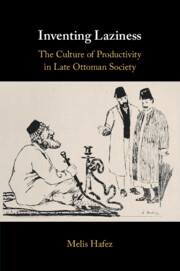Book contents
- Inventing Laziness
- Inventing Laziness
- Copyright page
- Contents
- Figures
- Preface
- Acknowledgments
- A Note on Translations and Transliteration
- Introduction
- 1 Moralizing Productivity in the Age of Reform
- 2 Criminalizing Laziness
- 3 Imagining Ottoman Dandies and Industrious Effendis
- 4 Militarizing the Productive Body
- 5 Exclusionism at Work
- Epilogue
- Bibliography
- Index
3 - Imagining Ottoman Dandies and Industrious Effendis
Published online by Cambridge University Press: 10 December 2021
- Inventing Laziness
- Inventing Laziness
- Copyright page
- Contents
- Figures
- Preface
- Acknowledgments
- A Note on Translations and Transliteration
- Introduction
- 1 Moralizing Productivity in the Age of Reform
- 2 Criminalizing Laziness
- 3 Imagining Ottoman Dandies and Industrious Effendis
- 4 Militarizing the Productive Body
- 5 Exclusionism at Work
- Epilogue
- Bibliography
- Index
Summary
Chapter 3 examines post-1873 depression-era Ottoman novels and plays that articulate a language of difference by juxtaposing the success of industrious heroes against the failure of consumerist dandy anti-heroes. The representation of industrious and dandy characters in fin-de-siècle Istanbul shows the interconnectedness and interdependence between novels and the discourses and practices of productivity, in sharing the same new moral universe. Differing from the normative and distant language of the morality authors, or the authoritative and punitive language of the bureaucratic reforms explored in Chapters 1 and 2, the playful voices of novelists displayed dynamic and at times ambivalent representations of the idle and dandy, as an alternate, yet socially undesirable form of self-fashioning. By pitting a hardworking and upwardly mobile hero against the dandy anti-hero, novels thematized the period’s concern with valuing work as a constitutive element of character and nation-building, and also drew boundaries that defined who was and was not included in the nation. As a forum in which citizenship was debated, fiction established difference using ridicule, marginalization, and even criminalization as a social intervention.
Keywords
- Type
- Chapter
- Information
- Inventing LazinessThe Culture of Productivity in Late Ottoman Society, pp. 147 - 193Publisher: Cambridge University PressPrint publication year: 2021

